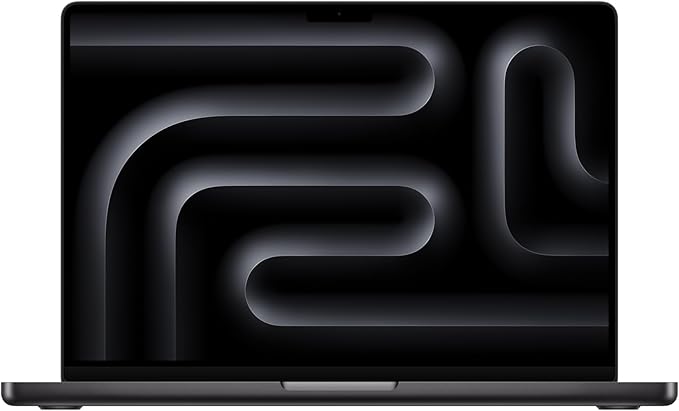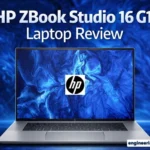Choosing a laptop for computer science can feel like hunting for a needle in a haystack. You need a machine that’s light enough to carry across campus, powerful enough to handle code compiles and virtual machines, and reliable enough to survive long nights in the library. The good news? You don’t need to spend $2,000 to get there. In 2025, there are excellent laptops under $1,000 that check all the right boxes for CS students.
This guide breaks down the best picks available right now, with a quick comparison table, detailed pros and cons, and a practical buying checklist. Whether you prefer Windows, macOS, or just want the best value for money, you’ll find an option that fits.
Also Read: Best Laptops for Computer Engineering Students
Quick Comparison: Best Laptops for Computer Science Students Under $1,000
| Laptop | CPU | RAM | Storage | Display | Weight | Highlights |
|---|---|---|---|---|---|---|
| MacBook Air 13 (M4) | Apple M4 | 8–16 GB | 256–512 GB SSD | 13.6″ Retina | 1.2 kg | Best battery & portability |
| Acer Swift Go 14 / Swift 3 | Intel Core Ultra / Ryzen 7 | 8–16 GB | 512 GB SSD | 14″ FHD | 1.2–1.4 kg | Best Windows ultraportable |
| Lenovo ThinkPad E14 / IdeaPad Slim 5 | Ryzen 5/7 or Intel i5 | 8–16 GB | 256–512 GB SSD | 14″ FHD | 1.4–1.6 kg | Best keyboard & durability |
| ASUS Vivobook 16 / S 14 | Ryzen 5/7 or Intel i5 | 8–16 GB | 512 GB SSD | 14–16″ FHD/OLED | 1.5–1.9 kg | Best for multitasking |
| HP Pavilion 15 | Ryzen 5/7 or Intel i5 | 8–16 GB | 256–512 GB SSD | 15.6″ FHD | 1.6–1.8 kg | Best budget value |
| Dell Inspiron 15 5000 | Intel i5 / Ryzen 5 | 8–16 GB | 256–512 GB SSD | 15.6″ FHD | 1.7–2.0 kg | Balanced all-rounder |
1. MacBook Air 13 (M4) — The All-Day Battery Champ
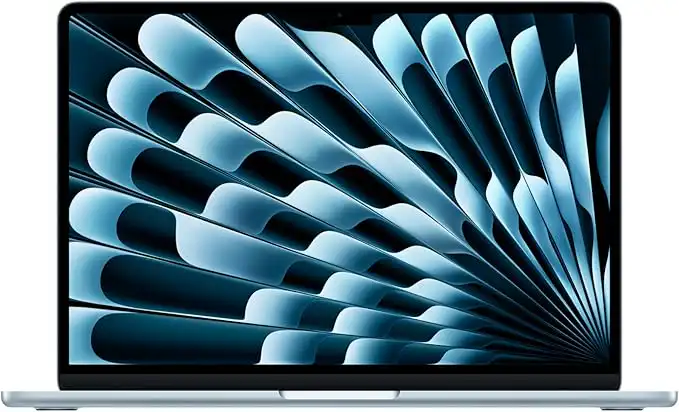
If your budget stretches to $999, the MacBook Air M4 is an absolute winner for computer science students.
- CPU: Apple M4 chip
- RAM: 8 GB (16 GB recommended)
- Storage: 256 GB SSD (512 GB preferred)
- Battery life: Up to 18 hours
- Weight: 1.2 kg
Pros:
✔ Whisper-quiet and cool even under heavy loads
✔ macOS is developer-friendly (Unix-based, strong support for Python, Java, C++, etc.)
✔ Amazing battery life — perfect for back-to-back lectures
Cons:
✘ Base model has only 8 GB RAM (go for 16 GB if you plan to use Docker or VMs)
✘ Limited ports — you’ll likely need a USB-C hub
👉 Why it works for CS students: Strong single-core performance means code compiles fly. Plus, you’ll rarely scramble for a charger.
2. Acer Swift Go / Swift 3 — Lightweight and Affordable
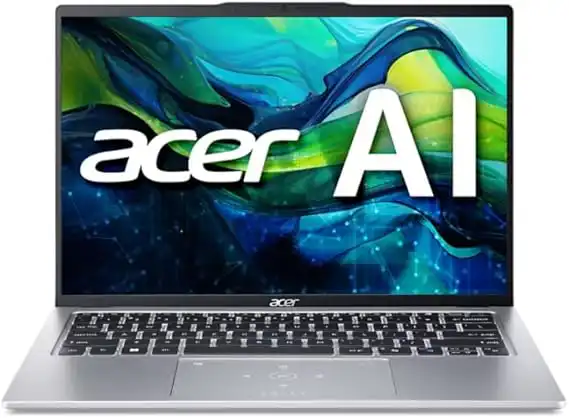
If you prefer Windows, the Acer Swift series delivers sleek design and solid performance without breaking the bank.
- CPU: Intel Core Ultra 7 or AMD Ryzen 7
- RAM: 16 GB recommended
- Storage: 512 GB SSD
- Weight: ~1.3 kg
Pros:
✔ Extremely portable
✔ Excellent value when discounted
✔ Plenty of ports for peripherals
Cons:
✘ Battery life varies depending on configuration
✘ Can throttle under sustained heavy loads
👉 Why it works for CS students: It balances power and portability, making it easy to carry to class while handling IDEs like IntelliJ, VS Code, or PyCharm.
3. Lenovo ThinkPad E14 / IdeaPad Slim 5 — Built to Last

Lenovo’s ThinkPad line is legendary for one reason: the keyboard. If you spend long nights coding, this matters.
- CPU: Ryzen 5/7 or Intel i5
- RAM: 16 GB ideal
- Storage: 512 GB SSD
- Weight: 1.4–1.6 kg
Pros:
✔ Best typing experience for long projects
✔ Sturdy build quality
✔ Good range of ports
Cons:
✘ Displays can be average (not super bright or color-rich)
✘ Slightly heavier than ultraportables
👉 Why it works for CS students: Durable, reliable, and comfortable for all-day typing — a real workhorse.
4. ASUS Vivobook 16 / S 14 — More Screen Space for Multitasking
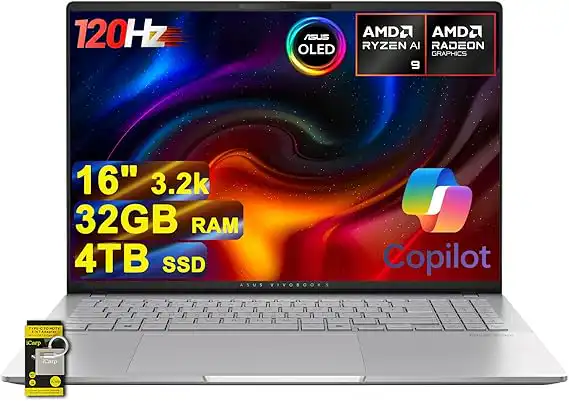
Bigger screens mean more space for terminals, docs, and IDEs side-by-side. The Vivobook line makes that possible under $1,000.
- CPU: Ryzen 5/7 or Intel i5
- RAM: 8–16 GB
- Storage: 512 GB SSD
- Display: 14–16″, some with OLED
- Weight: 1.5–1.9 kg
Pros:
✔ Large screen — perfect for multitasking
✔ OLED option offers gorgeous contrast
✔ Decent keyboards and design
Cons:
✘ Heavier to carry daily
✘ High-end configs can creep over $1,000
👉 Why it works for CS students: If you love big screens for productivity, this is a sweet spot without overspending.
5. HP Pavilion 15 — Best Budget Pick
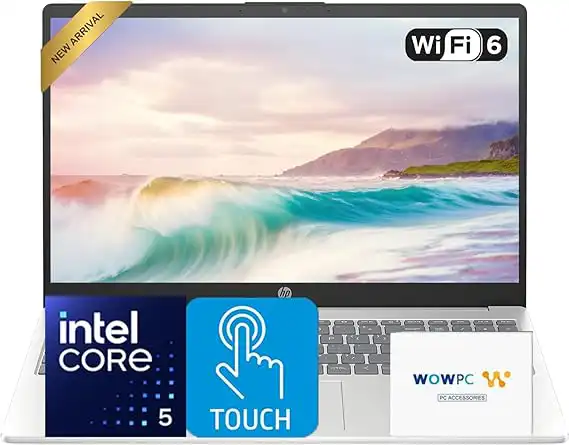
HP’s Pavilion series offers excellent bang for your buck.
- CPU: Ryzen 5/7 or Intel i5
- RAM: 16 GB recommended
- Storage: 512 GB SSD
- Display: 15.6″ FHD
Pros:
✔ Affordable with good performance
✔ Comfortable typing
✔ Great for everyday coding and schoolwork
Cons:
✘ Average battery life
✘ Build isn’t as premium as pricier laptops
👉 Why it works for CS students: A reliable choice when budget is tight but you still want solid performance.
6. Dell Inspiron 15 5000 — Reliable and Widely Available
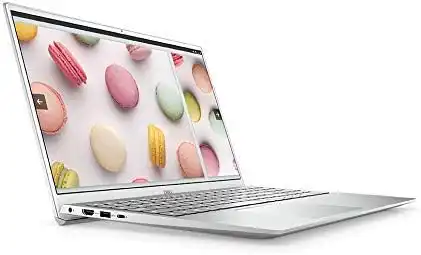
Dell Inspiron laptops are everywhere — and for good reason. They’re dependable, easy to find on sale, and come in a variety of configs.
- CPU: Intel i5 / Ryzen 5
- RAM: 16 GB
- Storage: 512 GB SSD
- Weight: ~1.8 kg
Pros:
✔ Solid all-round specs
✔ Affordable and often discounted
✔ Good warranty and support
Cons:
✘ Build quality varies by model — check reviews
✘ Heavier than ultraportables
👉 Why it works for CS students: Balanced and dependable, with plenty of support options if anything goes wrong.
Buying Checklist for Computer Science Students
- RAM: 16 GB is the sweet spot. 8 GB is limiting once you run VMs or emulators.
- Storage: 512 GB SSD gives breathing room. Cloud backup helps, but 256 GB fills fast.
- CPU: Modern Ryzen 5/7, Intel i5/i7, or Apple M-series chips handle coding smoothly.
- Screen size: 14″ for portability, 15–16″ for multitasking.
- Battery life: Aim for 8+ hours to survive full lecture days.
- Ports: USB-A, USB-C, HDMI — the more the merrier.
FAQs
No. Unless you’re taking heavy GPU-based machine learning courses, integrated graphics are more than enough.
Both work fine. macOS is great for Unix-like development. Windows offers wider software compatibility (and WSL for Linux support).
For students, RAM often matters more. A midrange CPU with 16 GB RAM feels smoother than a high-end CPU with only 8 GB.
Final Thoughts
You don’t have to overspend to get a solid laptop for computer science. If you want unbeatable battery and portability, the MacBook Air M4 is hard to beat. Prefer Windows? The Acer Swift or Lenovo ThinkPad E14 are excellent choices. On a budget? The HP Pavilion 15 or Dell Inspiron 15 give you dependable performance at an affordable price.
👉 Bottom line: Stick with 16 GB RAM, 512 GB SSD, and a recent CPU, and you’ll have a laptop that carries you through every coding class, group project, and late-night debug session.

